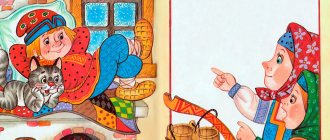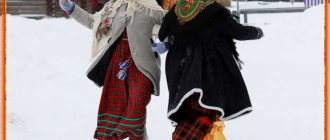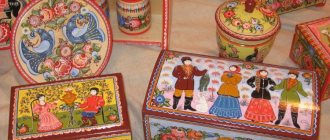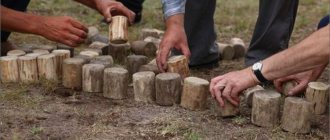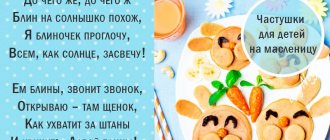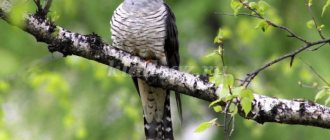Notes “Folk culture and traditions” lesson outline on the world around us (middle group)
“Culture and traditions of the Russian people” Lesson in the middle group.
Target:
-To consolidate children’s knowledge about the name of the country in which they live, about its nature. -Introduce some historical events and culture.
Tasks:
-Cultivate love for the Motherland, for the Russian people, respect for its traditions.
Equipment:
Geographical map, illustrations depicting the nature of Russia, books “Russian folk tales”, illustrations for fairy tales, folk arts and crafts, bread products, vegetables, cereals.
GCD:
A geographical map of Russia hangs on the board
Educator: Guys, today I want to talk to you about our country. What is the name of our country in which we live? (Children's answers)
The teacher points to the borders of Russia with a pointer and says:
Russia is a very big and beautiful country. In the vast forests of Russia, many berries and mushrooms grow, many different animals and birds live. Many rivers flow through our country. One of the largest is the Volga. There are many mountains in our country. Minerals are mined in the mountains: coal, iron and other metals. The capital of our Motherland is Moscow. Our country is very rich. It arose a long time ago and has an ancient and interesting history. How was such a huge state of Russia formed?! Previously, there were many principalities in Russia. The princes fought with each other and seized lands. But when foreign enemies attacked Rus', all the princes united to fight them. And then they decided to unite forever, chose their main prince, and he began to be called the king. And Russia became a large and strong state.
Educator: Our country is rich not only in forests, minerals, animals, but also in wonderful people. We talked about the talents of the Russian people. How did it manifest itself? What did the Russian people know how to do very well? What do you like to listen to since childhood? (Children's answers)
Educator: Russian people have composed many very good, interesting fairy tales. What Russian folk tales do you know? (Children’s answers) (The teacher displays books with Russian folk tales)
Didactic game “Guess the fairy tale” (work with illustrations)
Educator: The Russian people composed beautiful songs, Russian people loved to dance in circles, and also organize fairs. Guys, we came to a Russian fair, where beautiful products made by the hands of Russian craftsmen are sold.
(The teacher invites several children to choose one product each). Tell us about what you bought at the fair.
(Children's stories about objects of folk arts and crafts: Dymkovo toys, Khokhloma products, whistles, lace, nesting dolls...)
Educator: Every nation has its own traditions. How do you understand this word? What is tradition? (children’s answers).
Educator: Tradition is not a Russian word, but a Latin one, and translated it means transmission, i.e. Tradition is something that is passed on from one generation of people to another. Traditions are family. For example, almost all families celebrate the birthdays of family members, congratulate women on the Eighth of March, etc. There are national traditions: celebrating the New Year, Victory Day, Maslenitsa with pancakes and roller coaster rides... And there are also traditions associated with the preparation of various dishes - traditional national cuisine. It depends on what is grown in the country. What do they grow in Russia?
Children: vegetables, fruits, wheat, rye.
Educator: In our country, a lot of national dishes are prepared from flour, for example: pancakes, loaf, rasstegai... (Bring in bread products, examine and name them with the children)
Educator: And Russian people really love cabbage soup. What is cabbage soup made from? (children’s answers)
Didactic game “Find out by touch” (vegetables)
Educator: The Russian people have this saying: “Shchi and porridge are our food.” So what else do our people love?
Children: Porridge.
Physical school
Porridge-baby, you are so good, (one arm bent at the elbow imitates a saucepan, stir with the other hand) If you add a glass of milk. (“Pour milk”) We add a pinch of sugar and salt, (appropriate movements) We give small porridge to the children. (Giving hand movement) Baby porridge, you are so good, If you add a jug of milk. (“We hold the jug with both hands”) We put sugar and salt with a spoon, (appropriate movements) We give baby porridge to mothers. (Giving movement of hands) (In a low voice) Porridge, baby, you are so good, If you add a bucket of milk. (“We pour it with difficulty”) We put in handfuls of sugar and salt, (corresponding movements) We give baby porridge to dads (giving hand movement)
Educator: What can you cook porridge from?
Children: From cereals.
(There are jars of cereals on the table)
Educator: Name the cereals.
Didactic game: “What kind of porridge?”
(From semolina - semolina, from millet - millet, from buckwheat - buckwheat, from rice - rice, from corn - corn, from egg - barley.)
Lesson summary:
Educator: Today we talked about our country, about the talents of the Russian people, about different Russian traditions. The Russian people have a lot of traditions. What new did you learn today? What traditions and talents of our people do you remember? We will get to know them again.
